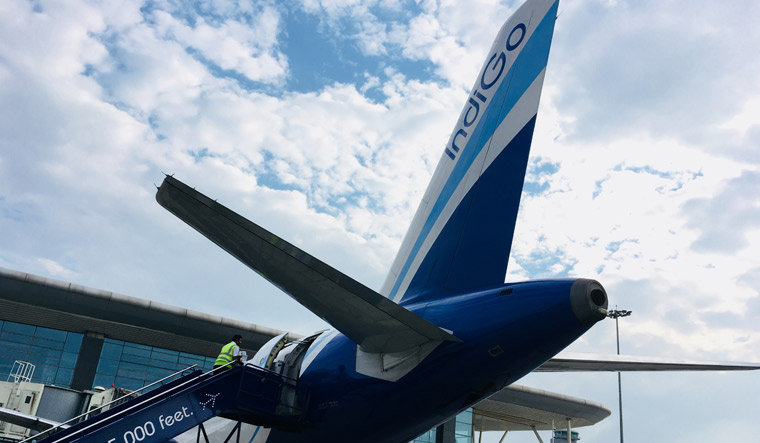Third IndiGo aircraft has been grounded in the last 24 hours after hydraulic leak was reported from the engine at Jammu airport on Sunday. Earlier on Saturday, two Indigo aircraft were grounded after pilots reported about glitches.
The aircraft belonged to Airbus' A320 Neo series, which have been in the news for its glitches-prone engines. With this, the total number of aircrafts grounded for faulty engines has risen to 12.
In the first incident, the aircraft that operated on the Bangalore-Delhi route was grounded for maintenance check at Delhi airport as the pilot reported about the malfunctioning engine.
During the maintenance check, metal chips were observed on an engine bearing a chip detector which is known to be a matter of concern with the Neo engines, according to a statement released by the airline.
Later in the day, another IndiGo Neo aircraft in Srinagar was grounded due to hydraulic leak from one of its two engines. Later, the aircraft was declared fit to fly after rectification of the problem.
On March 13, Directorate General of Civil Aviation (DGCA) grounded 11 Airbus 320 Neo aircraft owned by IndiGo Airlines and Go Air following multiple instances of engine-related problems.
Responding to the incident of hydraulic leakage, the airline, said, "A320neo aircraft that operated Delhi-Srinagar was cleared after maintenance checks upon arrival at Srinagar airport. However, during engine start the pilot-in-command observed a hydraulic (not oil) leakage from #2 engine." The aircraft was immediately withdrawn to investigate the hydraulic leak and the aircraft was fit to fly after engineers fixed the problem, it added.
Aviation regulator Directorate General of Civil Aviation (DGCA) had on March 12 ordered the grounding of 11 A320Neo planes fitted with P&W1100 engines beyond ESN 450 series due to recurring problems, including mid-air shutdowns.
Of these, eight belong to IndiGo and the rest are of GoAir. Another three A320Neos of IndiGo are already on the ground since February.
The slew of incidents come ahead of the submission of an affidavit by the DGCA next week to the Bombay High Court, in response to a PIL, on the steps taken by it to quell the anxiety of passengers over issues related to these engines.
A city resident, Harish Agarwal, in his PIL has sought appropriate directions to the civil aviation authorities over recent reports that certain 'Pratt & Whitney (P&W) engines', which power A320neo planes, were more susceptible to engine failures.
Concerns over the safety of such planes increased with another engine failure forcing the emergency landing of an IndiGo flight at Ahmedabad airport on March 12.
This had forced the regulator to crack the whip saying that there was no concrete proposal in place at this stage to address the issue.
On March 16 too, oil chip was detected on engine 2 of the VT ITE (A320neo) at Hyderabad and the plane had to be ferried to Delhi after obtaining the DGCA's nod. On March 13, IndiGo aircraft VT-ITH operating on the Mumbai-Delhi route had confronted the same problem. "Both IndiGo and GoAir have been told not to refit these engines, which are spare with them in their inventory," the DGCA had said at the time of grounding the fleet.
Consequently, both IndiGo and GoAir have cancelled over 600 flights this month, with 488 flights by IndiGo alone.
On February 9, the European Aviation Safety Agency (EASA) had issued an emergency airworthiness directive for A320neo planes fitted with P&W1100 engines having a particular serial number.
The directive followed instances of the engines shutdown during flights and rejected take-offs involving the A320neo aircraft.
On February 13, DGCA had said that it was monitoring engine glitches to ensure that safety was not compromised.

